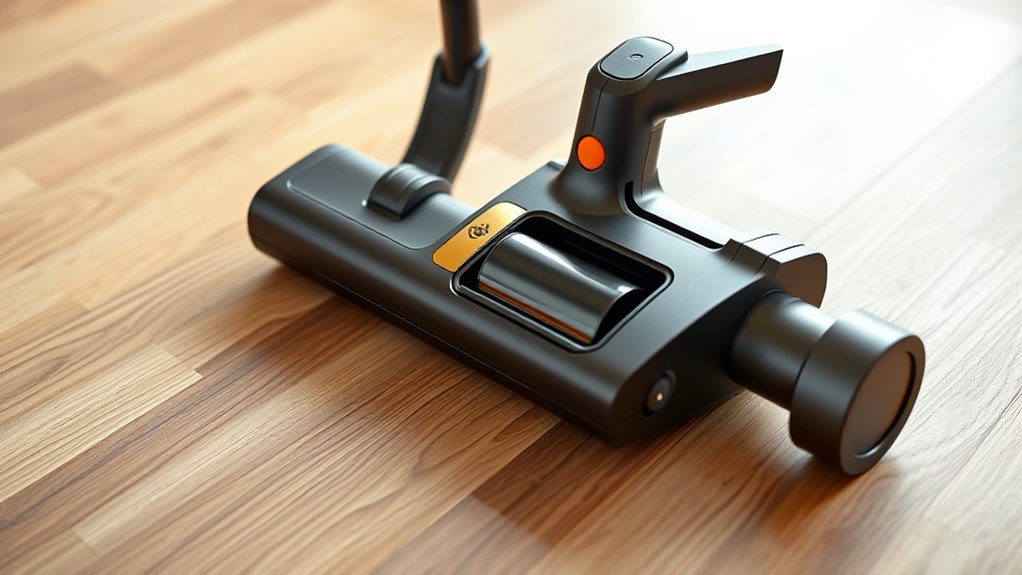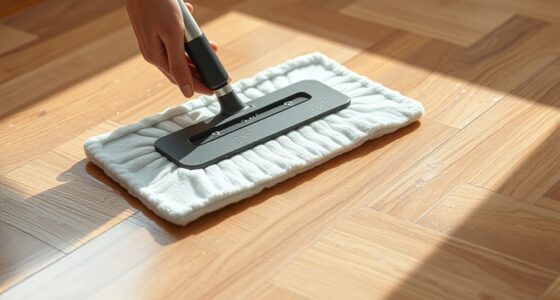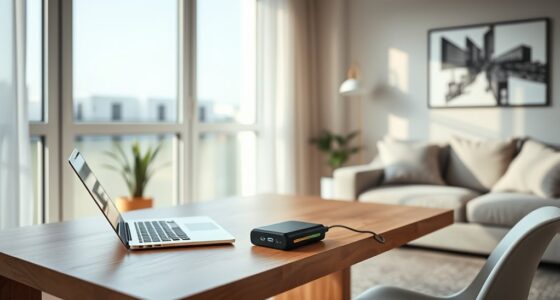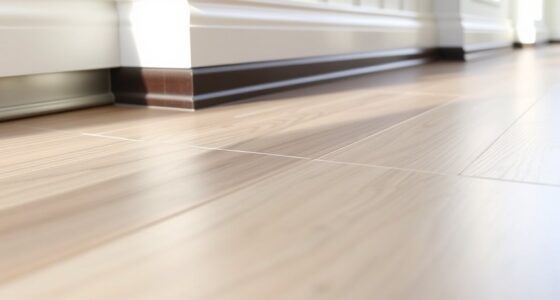To extend your battery’s runtime and lifespan on vinyl plank floors, choose the right batteries that match your device’s needs and follow proper charging habits—avoid overcharging and disconnect once fully charged. Store batteries in a cool, dry place and clean contacts regularly to prevent corrosion. Use protective pads when handling cordless tools to prevent floor damage. Keeping these tips in mind helps your batteries last longer; keep going to discover more ways to protect your floors and devices.
Key Takeaways
- Use rechargeable batteries to reduce waste and ensure consistent power for devices on vinyl floors.
- Store batteries in a cool, dry place to prevent degradation and extend their lifespan.
- Avoid overcharging batteries to prevent damage and maintain optimal performance.
- Regularly check batteries for corrosion or leaks, replacing them promptly to protect floors and devices.
- Match battery type and voltage with device specifications for safe, efficient operation on vinyl plank floors.
Choosing the Right Batteries for Your Devices
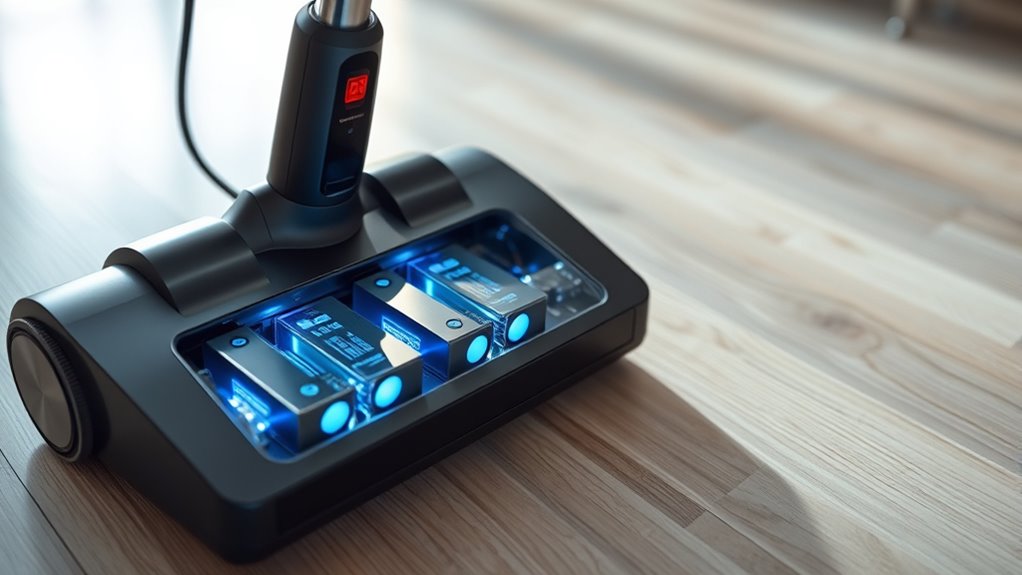
Choosing the right batteries for your devices is essential to guarantee they operate efficiently and last longer. You need to take into account the device’s power requirements and match them with the correct battery type, whether it’s AA, AAA, lithium-ion, or specialized batteries. Check the manufacturer’s recommendations to avoid using incompatible options, which can damage your device or reduce battery life. Pay attention to voltage, capacity, and size to ensure a proper fit. Investing in high-quality batteries can provide more consistent performance and prevent frequent replacements. Also, take into consideration rechargeable options if you use the device often—these can save money and reduce waste over time. Making informed choices about batteries helps maintain your device’s functionality and optimizes overall battery life. Additionally, understanding how luxurious tiny house features influence energy consumption can help you select batteries that support your lifestyle efficiently.
Proper Charging Techniques to Maximize Battery Life
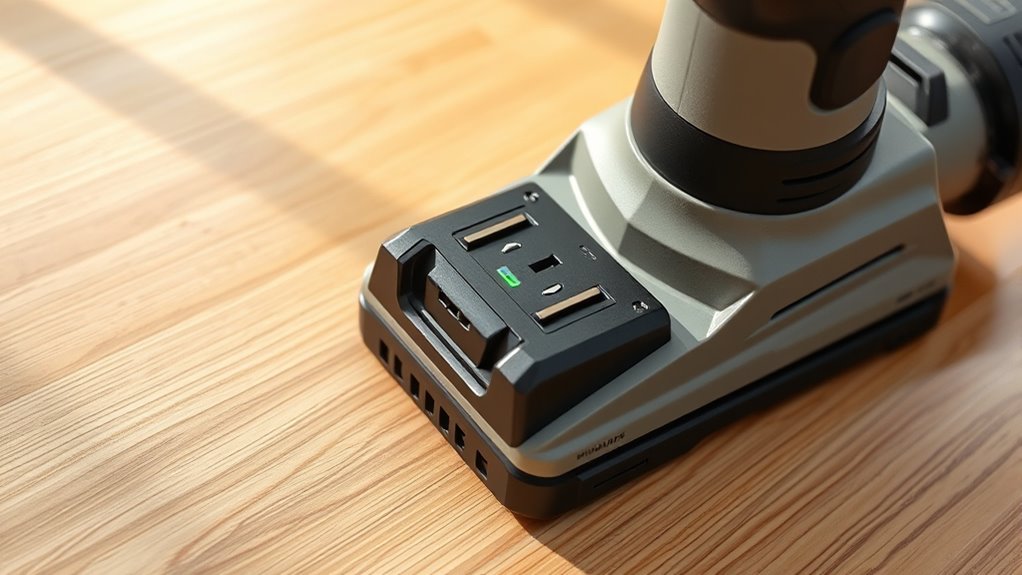
Once you’ve selected the right batteries for your devices, applying proper charging techniques can substantially extend their lifespan. To maximize battery life, avoid overcharging or discharging completely. Instead, unplug devices once they reach full charge and recharge before they’re fully drained. Use chargers compatible with your batteries to prevent damage. Consider the following tips:
| Tip | Why It Matters | Best Practice |
|---|---|---|
| Avoid Overcharging | Prevents battery overheating | Unplug once fully charged |
| Don’t Fully Discharge | Extends battery cycles | Recharge before low battery indicator |
| Use Proper Chargers | Ensures safe, efficient charging | Always use manufacturer-recommended chargers |
| Keep Batteries Cool | Reduces degradation | Store and charge in a cool environment |
Additionally, monitoring battery management practices can help maintain optimal performance over time.
Regular Maintenance and Storage Tips
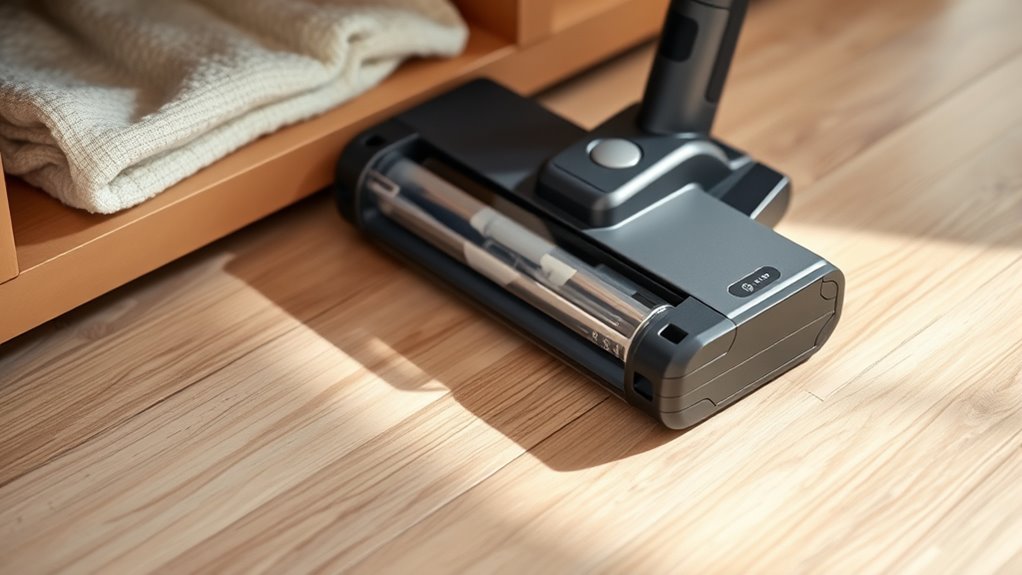
To keep your vinyl plank floors looking their best, regular maintenance and proper storage are essential. Regularly sweep or vacuum to remove dirt and debris that can scratch the surface. Use a damp mop with a mild cleaner specifically designed for vinyl floors to keep them clean without damage. When not in use, store batteries in a cool, dry place away from direct sunlight and extreme temperatures. Avoid stacking batteries tightly to prevent warping or damage. Keep batteries away from metal objects to prevent short circuits. Check batteries periodically for signs of corrosion or leakage, and clean contacts gently with a soft cloth if needed. Proper care guarantees your floors stay beautiful and your batteries perform at their peak over time. Incorporating proper maintenance techniques can further extend the lifespan of both your floors and batteries.
Recognizing When to Replace Batteries

Knowing when to replace your batteries is essential to guarantee your vinyl plank floors stay protected and your devices function properly. You’ll notice a decline in performance, such as shorter runtime or slower operation, which indicates the battery’s charge is diminishing. If your cordless tools or devices no longer hold a charge after a full recharge or need frequent recharging, it’s time for a replacement. Additionally, swollen or leaking batteries are clear signs they’re failing and should be discarded immediately. Pay attention to warning indicators like dimming lights or inconsistent power. Regularly testing your batteries helps prevent unexpected failures, ensuring your tools remain reliable and your floors stay protected from damage caused by malfunctioning equipment. Being aware of security vulnerabilities can help you take steps to protect your devices from potential threats. Replacing batteries at the right time keeps everything running smoothly.
Best Practices for Using Cordless Tools on Vinyl Floors
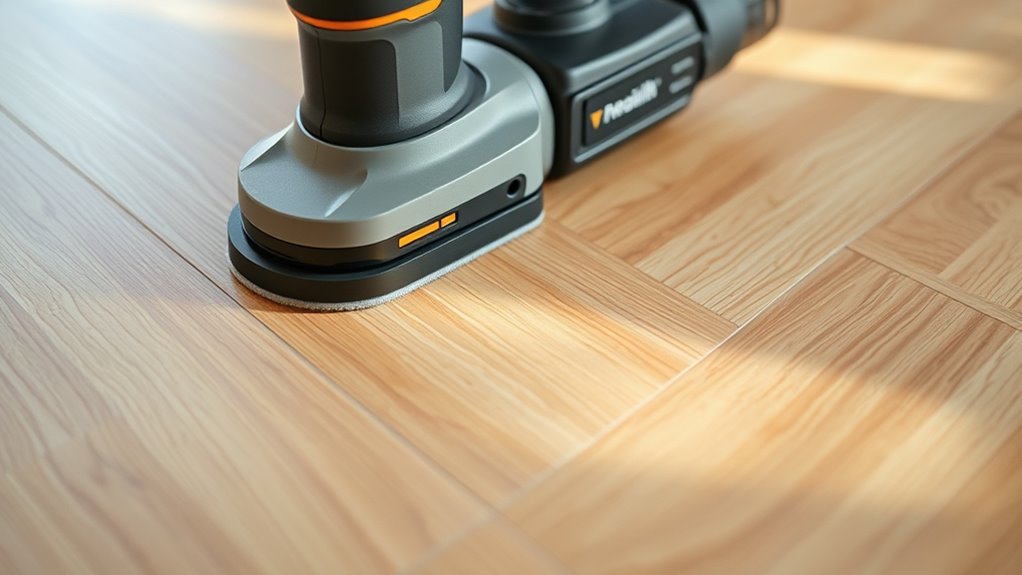
Using cordless tools on vinyl floors requires careful attention to prevent damage and guarantee safety. Always check your tool’s settings before use, ensuring it’s appropriate for delicate surfaces. Keep tools at a controlled speed to avoid gouging or scratching. Use protective pads or mats underneath tools when possible, especially during prolonged tasks. Maintain a clean workspace to prevent debris from scratching the vinyl. Finally, avoid dragging tools across the floor; lift or carry them instead. Be aware that Kia Tuning options can influence the weight and handling of vehicles, which might affect how you manage tools around them.
Frequently Asked Questions
How Do Temperature Fluctuations Affect Battery Performance on Vinyl Floors?
Temperature fluctuations can considerably impact your battery’s performance on vinyl floors. When it’s too hot, batteries may overheat, reducing their lifespan and causing shorter runtimes. Cold temperatures slow down chemical reactions inside the battery, leading to decreased efficiency and shorter use times. To maintain ideal performance, keep your batteries within a recommended temperature range, avoid exposing them to extreme heat or cold, and store them in a stable environment.
Can Certain Cleaning Products Damage Batteries Used Near Vinyl Plank Flooring?
Certain cleaning products can compromise your batteries’ capacity and lifespan. Harsh chemicals, like ammonia or bleach, can cause corrosion, cracks, and reduced efficiency. You should steer clear of abrasive agents and opt for mild, battery-friendly cleaners. By being cautious and choosing carefully, you protect your power source, prolonging both battery life and your vinyl plank floors’ pristine condition. Proper cleaning creates a perfect, protected pairing for prolonged performance.
What Safety Precautions Should I Take With Battery-Powered Devices on Vinyl Floors?
When using battery-powered devices on vinyl floors, you should always wear slip-resistant shoes to prevent falls, avoid dragging devices to prevent damage, and keep cords away from walkways to prevent tripping. Make sure the devices are turned off when not in use, and regularly inspect batteries for leaks or damage. Always follow manufacturer safety instructions and keep liquids away from batteries to avoid hazards.
Are There Specific Battery Brands That Are Better for Vinyl Floor Maintenance Tools?
Think of battery brands as dependable partners in your vinyl floor maintenance journey. Brands like Milwaukee, DeWalt, and Makita stand out, offering reliable power and longer-lasting performance. You’ll want batteries with high-quality cells, good thermal management, and fast charging capabilities. These trusted names not only keep your tools running smoothly but also protect your floors from unexpected mishaps, ensuring your maintenance routine is as seamless as a well-choreographed dance.
How Does Frequent Cycling Impact the Overall Lifespan of Batteries in Household Devices?
Frequent cycling can shorten your battery’s overall lifespan because each charge and discharge stresses the cells. When you cycle batteries often, they wear out faster, losing capacity over time. To extend their life, try to avoid deep discharges and recharge before they’re completely empty. Using smart chargers and storing batteries properly also helps reduce wear, ensuring your household devices stay powered longer without needing replacements.
Conclusion
Think of your batteries like a trusted garden hose—you want to keep the water flowing smoothly. When you follow proper care, avoid leaks, and replace them when needed, your tools will run longer and stay healthier. I once ignored this advice, and my cordless drill gave out just before finishing a project. Don’t let your battery life be the weak link—by caring for them, you’ll keep your vinyl floors sparkling and your tools ready whenever you need them.
